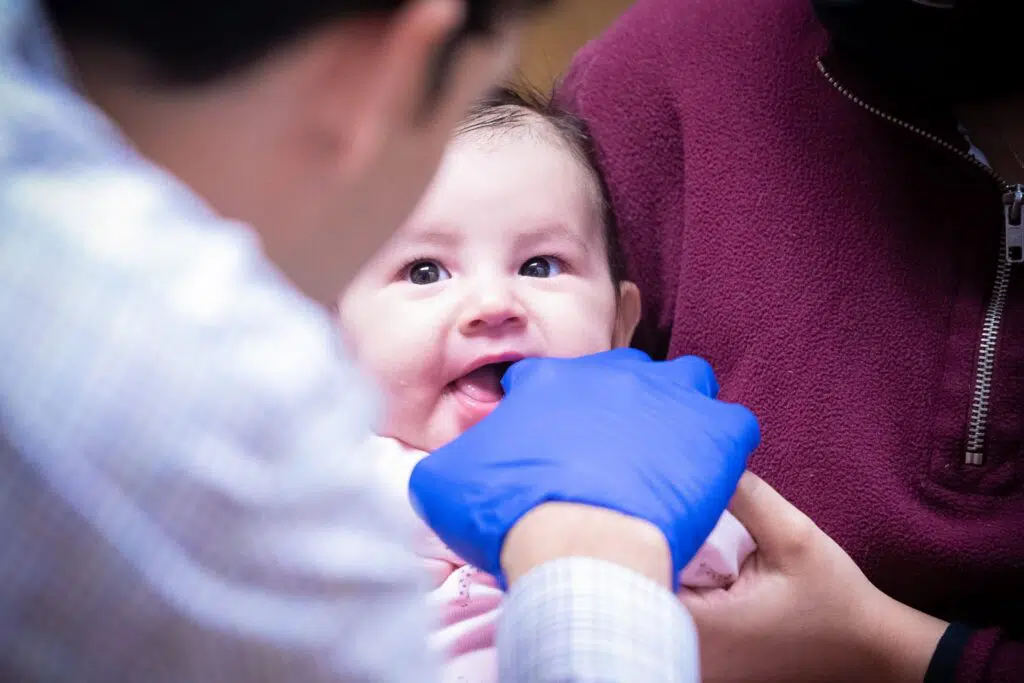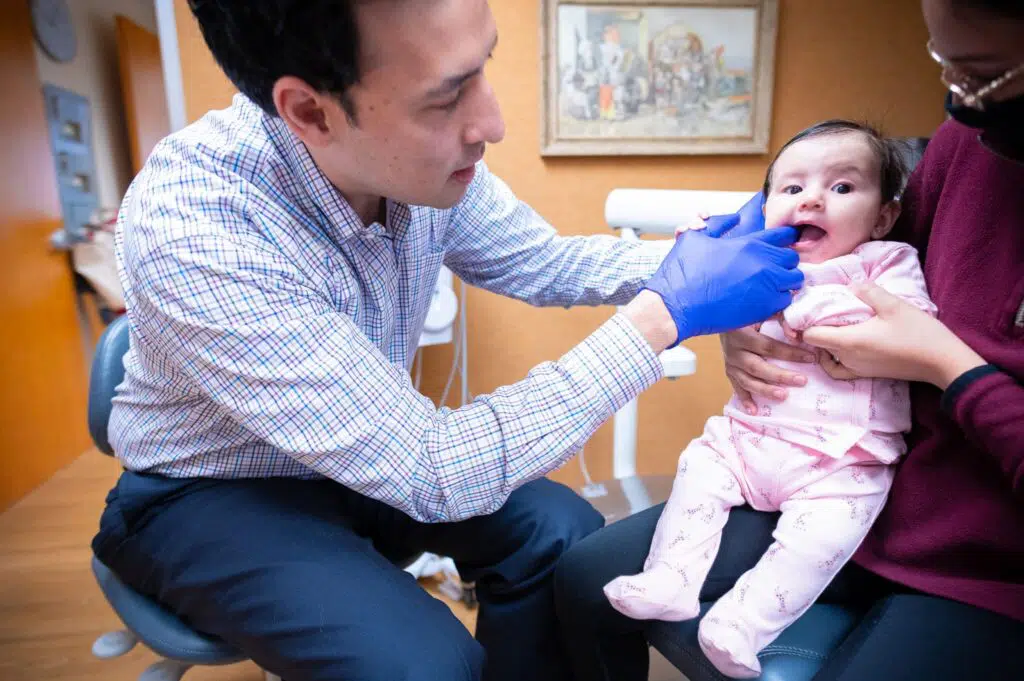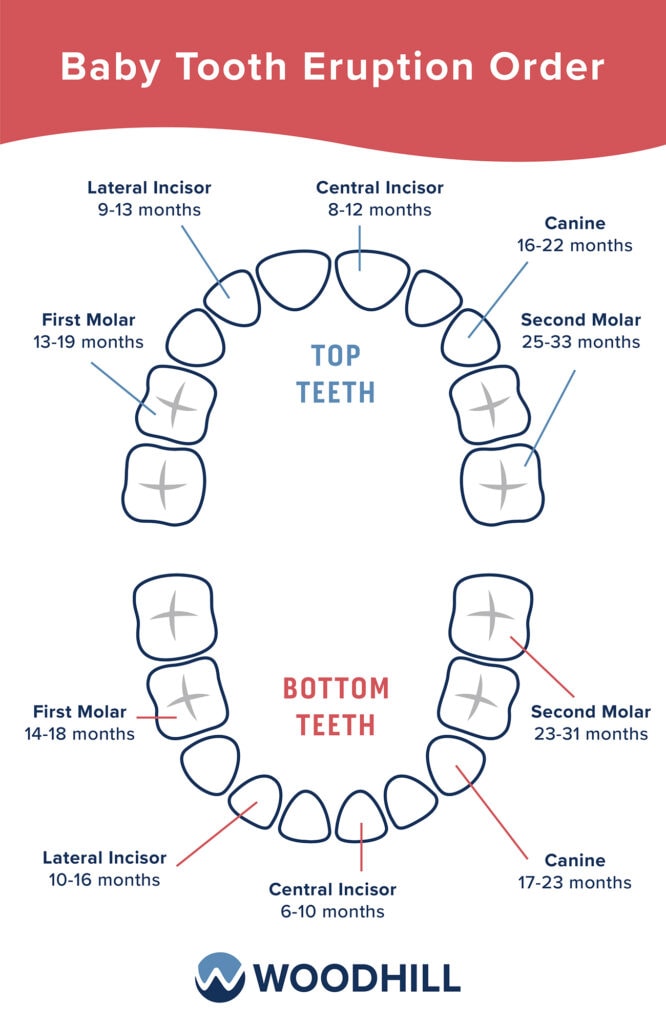When to worry about baby teeth not coming in is a question many new parents face. So when do babies’ teeth come in? The average age is anywhere from 6 months to 12 months, though some babies will get teeth earlier and some will get them later. Timing isn’t that important; however, if your baby still has no teeth by the age of 18 months, it may be time to see a pediatric dentist for an evaluation. In most cases, delayed tooth eruption is no real concern. However, it is still a good idea to get a specialist’s opinion.

Baby teeth coming in late can be caused by several different factors, such as:
Developmental disorders: Delayed tooth eruption is more common in babies with developmental disorders such as hypopituitarism, a disorder of the pituitary gland (the gland that secretes growth hormones) that results in delayed growth and development.
At one end of the spectrum, we see parents whose baby has no teeth at 12 months, and they are concerned that there may be a serious health issue. On the other end of the spectrum, some people think late teething is a sign of intelligence.
The reality is: There are no serious risks related to baby teeth coming in late (and also no indication that this is a sign of higher intelligence). However, some studies have shown that children who experience late tooth eruption are at an increased risk of tooth decay.

Practicing good oral hygiene at home and keeping up with regular dental visits are important for good oral health. There is also a greater chance that a child with delayed teeth development will need orthodontic care later in childhood or during adolescence.
Neither of these risks is a major cause for concern, as nearly 80% of children will need orthodontic care before they reach adulthood, and routine pediatric dental care and hygiene should be a regular part of everyone’s routine.
In most cases, delayed teeth eruption does not pose a risk to a child’s permanent teeth or long-term oral health.
There’s no need to treat delayed tooth eruption unless it’s caused by malnutrition. We just need to keep an eye on it. We do know, though, that delayed tooth eruption can indicate future dental problems that need treatment — primarily orthodontic issues.
If your child experiences delayed eruption of primary teeth, they might have trouble eating certain healthy foods that require teeth to bite into. You may need to consult with a nutritionist to make sure their diet is well-rounded.
Most babies will develop teeth between 6 months and 12 months of age. If you’re worried that your baby’s first tooth hasn’t come in yet, contact Woodhill Dental Specialties to make an appointment. We specialize in pediatric dentistry and orthodontics, as these two services go hand in hand. You can visit one office for all of your kids’ oral care needs from the time they are a baby all the way through their adolescence.
So when should you worry about baby teeth not coming in yet? The timing of when a baby’s first tooth appears can vary widely. Some babies may be born with teeth, and some may not have any teeth by their first birthday.
Around three months of age, babies begin to explore the world around them — primarily by sticking everything they can get ahold of right in their mouth. Many parents think this new behavior means that their baby has started teething, but a first tooth typically appears around six months old.

The lower front teeth (lower central incisors) are almost always the first teeth to come in, and most children will have all of their baby teeth by three years of age.

The American Dental Association recommends that children have their first dentist appointment when they get their first tooth or at one year old — whichever comes first. Although many parents postponed these first visits, we do encourage you to schedule an appointment by 18 months if teeth haven’t emerged by this time. We’ll do a thorough exam and take x-rays during this appointment to diagnose any problems that might be underneath the surface.
Call 214-691-1172 today or contact us online to schedule an appointment at our Dallas, TX, or Rockwall, TX, office. We look forward to helping your child get started on the road to a lifetime of healthy teeth.

Most babies will develop teeth between 6 months and 12 months of age. An 8-month-old with no teeth is still very common.
Most babies will develop teeth between 6 months and 12 months of age. If your baby has no teeth at 9 months, they are still well within the “normal” range for baby teeth development.
1-year-old with no teeth? The American Dental Association recommends that children have their first dentist appointment when they get their first tooth or at one year old — whichever comes first.
Since most babies will develop teeth by 12 months of age, we recommend scheduling a pediatric dental visit if your child has not gotten his or her first tooth by this time. While this may not be a major issue, having your child examined is a good idea to ensure there are no underlying issues.